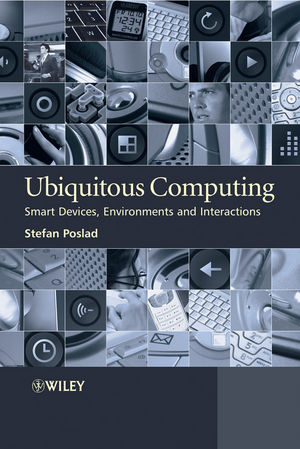Ubiquitous Computing: Smart Devices, Environments and InteractionsISBN: 978-0-470-03560-3
Hardcover
496 pages
April 2009
 This is a Print-on-Demand title. It will be printed specifically to fill your order. Please allow an additional 10-15 days delivery time. The book is not returnable.
|
||||||
List of Figures xix
List of Tables xxiii
Preface xxv
Acknowledgements xxvii
1 Ubiquitous Computing: Basics and Vision 1
1.1 Living in a Digital World 1
1.2 Modelling the Key Ubiquitous Computing Properties 8
1.3 Ubiquitous System Environment Interaction 22
1.4 Architectural Design for UbiCom Systems: Smart DEI Model 26
1.5 Discussion 34
2 Applications and Requirements 41
2.1 Introduction 41
2.2 Example Early UbiCom Research Projects 41
2.3 Everyday Applications in the Virtual, Human and Physical World 53
2.4 Discussion 67
3 Smart Devices and Services 75
3.1 Introduction 75
3.2 Service Architecture Models 80
3.3 Service Provision Life-Cycle 91
3.4 Virtual Machines and Operating Systems 106
4 Smart Mobiles, Cards and Device Networks 115
4.1 Introduction 115
4.2 Smart Mobile Devices, Users, Resources and Code 115
4.3 Operating Systems for Mobile Computers and Communicator Devices 123
4.4 Smart Card Devices 126
4.5 Device Networks 128
5 Human–Computer Interaction 135
5.1 Introduction 135
5.2 User Interfaces and Interaction for Four Widely Used Devices 138
5.3 Hidden UI Via Basic Smart Devices 143
5.4 Hidden UI Via Wearable and Implanted Devices 152
5.5 Human-Centred Design (HCD) 157
5.6 User Models: Acquisition and Representation 163
5.7 iHCI Design 167
6 Tagging, Sensing and Controlling 179
6.1 Introduction 179
6.2 Tagging the Physical World 180
6.3 Sensors and Sensor Networks 187
6.4 Micro Actuation and Sensing: MEMS 194
6.5 Embedded Systems and Real-Time Systems 199
6.6 Control Systems (for Physical World Tasks) 202
6.7 Robots 204
7 Context-Aware Systems 213
7.1 Introduction 213
7.2 Modelling Context-Aware Systems 216
7.3 Mobility Awareness 227
7.4 Spatial Awareness 229
7.5 Temporal Awareness: Coordinating and Scheduling 235
7.6 ICT System Awareness 238
8 Intelligent Systems (IS) 245
With Patricia Charlton
8.1 Introduction 245
8.2 Basic Concepts 246
8.3 IS Architectures 249
8.4 Semantic KB IS 263
8.5 Classical Logic IS 268
8.6 Soft Computing IS Models 271
8.7 IS System Operations 272
9 Intelligent System Interaction 279
With Patricia Charlton
9.1 Introduction 279
9.2 Interaction Multiplicity 279
9.3 Is Interaction Design 295
9.4 Some Generic Intelligent Interaction Applications 306
10 Autonomous Systems and Artificial Life 317
10.1 Introduction 317
10.2 Basic Autonomous Intra-Acting Systems 318
10.3 Reflective and Self-Aware Systems 322
10.4 Self-Management and Autonomic Computing 326
10.5 Complex Systems 332
10.6 Artificial Life 336
11 Ubiquitous Communication 343
11.1 Introduction 343
11.2 Audio Networks 344
11.3 Data Networks 347
11.4 Wireless Data Networks 350
11.5 Universal and Transparent Audio, Video and Alphanumeric Data Network Access 356
11.6 Ubiquitous Networks 360
11.7 Further Network Design Issues 365
12 Management of Smart Devices 379
12.1 Introduction 379
12.2 Managing Smart Devices in Virtual Environments 380
12.3 Managing Smart Devices in Human User-Centred Environments 404
12.4 Managing Smart Devices in Physical Environments 412
13 Ubiquitous System: Challenges and Outlook 421
13.1 Introduction 421
13.2 Overview of Challenges 422
13.3 Smart Devices 425
13.4 Smart Interaction 428
13.5 Smart Physical Environment Device Interaction 430
13.6 Smart Human–Device Interaction 436
13.7 Human Intelligence Versus Machine Intelligence 441
13.8 Social Issues: Promise Versus Peril 444
13.9 Final Remarks 450
Exercises 451
References 452
Index 455



